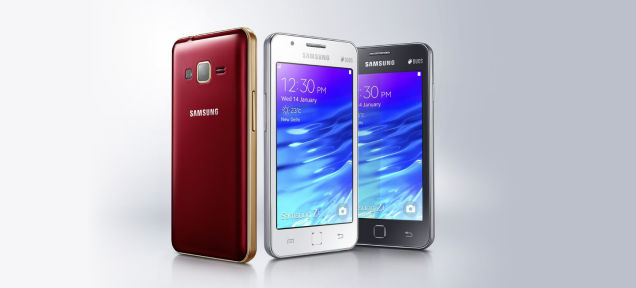Samsung’s first smartphones to be powered by its Tizen operating system have gone on sale.The Z1 handsets are available in India for 5,700 rupees ($92; £60) and, according to the firm, offer faster boot times and longer-lasting battery life than many budget-priced rivals.
Samsung had previously planned to sell Tizen phones in Russia and Japan, but cancelled the launches.
One expert said the Indian move represented a shift away from Android.
“Tizen is Samsung’s big software platform bet,” said Ben Wood from the telecoms consultancy CCS Insight.
“Until now, its software strategy has been predicated by the decisions Google has made with Android, and it’s been able to use that relationship to enormously positive benefit.
“However, it’s now finding it increasingly challenging to differentiate what it offers with Android-powered devices versus its rivals. Hence the difficulty it’s having standing out from the crowd with its products and the related market share loss that it’s suffered.
“By using Tizen, Samsung can make its phones very skinny indeed and there are also battery life advantages versus Android, which we’ve already seen with its Tizen-powered smartwatches.”
Samsung is currently the world’s bestselling manufacturer of handsets running Android,
However, the firm was a notable holdout when Google announced its Android One programme for India in September – an effort by the search giant to help manufacturers release low-cost “high quality” phones in the country by setting minimum standards and sourcing several of the hardware components for them.
Bollywood downloads
Samsung’s Z1 handsets features:
- A 4in (10.2cm) providing 480p resolution
- A 3.1 megapixel rear camera and a 0.3 megapixel front one
- Four gigabytes of internal memory that can be further expanded via the addition of a microSD card
- Support for two Sim cards at once – a popular feature in the country as it helps users obtain the best rates by switching provider when crossing states
The South Korean firm says it can provide up to eight hours of talktime or seven hours of non-stop video playback between charges.
To aid its appeal, the firm is also providing free access to Bollywood songs and movies for three months via tie-ups with local services Hungama, nexGTv and Box TV.
Lenovo, HTC, Acer, Asus and Panasonic are taking part in Google’s Android One programme
It has also struck a deal to provide 500 megabytes of included 3G data a month for half a year if the devices are used on Reliance or Aircel’s local networks. By contrast Google’s Android One scheme offers 200MB of Google Play downloads for six months if used on Bharti Airtel’s network.
‘Achilles heel’
Samsung already uses Tizen to power several of its smartwatches – including its top-end curved Gear S – and cameras. It also announced at the Consumer Electronics Show (CES) in Las Vegas earlier this month that all its new smart TVs would run off the platform.
The open-source operating system is based on Linux and uses the web language HTML5 as the focus for app development rather than native code, meaning software writers should find it easy to work with.
Huawei, Fujitsu, Intel and LG among other tech firms that have signed up to a consortium dedicated to supporting the software’s development. But to date, Samsung has taken the lead in attempting to bring it to consumer devices.
“The challenge is that in the mass market smartphone space, any platform other than Android and Apple’s iOS is struggling to get traction,” said Mr Wood.
“Even with the enormous resources of Microsoft, Windows Phone has struggled to emerge as a third platform.
“India is, however, a logical place for Samsung to bring Tizen because it’s such a cost sensitive market. If it can successfully ramp up volume in the country, there would be little reason for it not to bring it to other low-cost markets this year.
“But I don’t see it breaking through in major markets like Europe and North America. Its Achilles heel is that it doesn’t have the breadth of applications and it’s just not compatible with what consumers there want.”
Samsung cancelled the release of a Tizen-based smartphone in Russia last August saying it wanted more time to “enhance” the ecosystem – a decision interpreted by some to mean that it needed more apps.
The network NTT Docomo had earlier pulled plans to launch a Tizen-powered Samsung phone in Japan in March because it felt its local market could not sustain another operating system, according to the Wall Street Journal.

